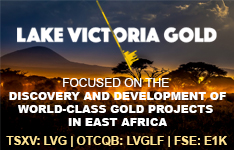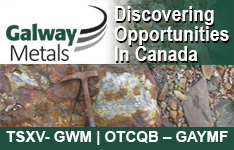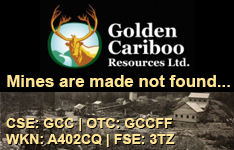The Gold Report: A news story in mid-May reported that billionaire hedge fund manager George Soros had almost $240 million ($240M) in gold-related positions. Moreover, on May 16 he had purchased $25M in call options on the Market Vectors Junior Gold Miners ETF (GDXJ). What are your thoughts on that move?
Michael Ballanger: All one needs to look at is the historical relationship between gold and gold shares to see the logic behind such a move. With every market on every continent now surging to record high levels in response to central bank stimuli, it would be reasonable to manage risk by owning one of the most beaten-down sectors I can ever recall.
TGR: Why does someone like Soros buy gold-related instruments and not equities, even the large caps?
MB: In the case of the GDXJ, he is actually buying a "basket" of equities related to gold/silver mining and exploration. By doing this, he spreads his risk over a large population of companies in the same space. Picking individual companies in this space invites execution risk because as we have seen in numerous cases in the past decade, a one-off event such as politics or natural disasters can undermine a correct call on the sector as a whole.
TGR: Are you aware of other big-time players that are making similar moves?
MB: Not specifically and certainly no one as notable as Mr. Soros. It is interesting that the managers who were early in the gold trade such as Eric Sprott are more bullish today than ever and that is noteworthy given gold's performance since 2000; despite this current correction and in my view, it is a correction rather than a secular bear.
TGR: When last we spoke you were convinced the market had found a psychological bottom. You noted that at the end of 2012, the TSX Venture Exchange (TSX.V)—acting as a proxy for the junior mining sector—was trading at 0.71 times the gold price. As of May 31, it was 0.69 times the gold price. Do you see the TSX.V-gold price ratio moving further sideways for the foreseeable future?
MB: I based my "bottom call" on sentiment. The sentiment in the junior space in January was abysmal and it is just as abysmal today. However, weak sentiment numbers, while historically reliable, do not tell you that the price has stopped declining. In that context, I was early because not only has the Venture Exchange dropped to new lows under 1,000, the TSX.V-gold ratio has recently hit .66 versus the bull market high over 5.0, which is actually quite remarkable.
TGR: What's your thesis for investing in mining equities (large, mid and small cap)? Precious metals investors want to know what they should do over the course of the summer months. What's your advice?
MB: There is always a degree of seasonality to the mining sector and the numbers dictate that one should wait until mid-August to begin initiating positions but I suspect that may be too "cute" because of the severity of the valuation compression we are witnessing in the juniors. Companies that were considered good value at $75/ounce (Measured) are now trading at under $20/ounce and so these prices may not wait for mid-August if gold decides to reverse or if sentiment shifts early back to the bull camp.
TGR: In our last interview you discussed "well incubated" junior mining companies, ones with a core of investors that understand how the game is played and have the long play in mind. Where are those companies?
MB: In a nutshell, some have done quite well but most have been disappointing. Despite either positive earnings reports or new discoveries, each time they try to lift off the bottom, they have been sold as a liquidity event. It is almost a Pavlovian reaction; they sell off because they have sold off in the past and until new volumes come in to relieve the supply that will not change until sentiment changes.
TGR: In January, you told our readers about Tinka Resources Ltd. (TK:TSX.V; TLD:FSE; TKRFF:OTCPK). What's happening with Tinka now?
MB: Since the January interview, Tinka has continued to execute its corporate strategy of upgrading the Peruvian silver resource to Measured from Inferred while adding more ounces, but the big event was the recent A13-05 drill result, which was arguably one of the best massive sulphide intercepts in at least my time in this space. Sixty meters of 7.75% zinc with the total section of mineralized envelope running north of 200 meters is a very encouraging, if not spectacular, intercept. The company completed a financing in May (full disclosure: RichardsonGMP participated in that funding) and is now poised to recommence with further exploration on Ayawilca (the zinc) while finishing off the redefinition of Colquipucro (the silver). The share price has retrenched from the all-time high of $1.25 in March to the current $.75–.80 range.
TGR: Would you like to give any other updates on companies you've mentioned in previous interviews? At the moment, are there any other companies you're closely following?
MB: Bitterroot Resources Ltd. (BTT:TSX.V) is another name in the unloved category. When I met its president, Michael Carr, he showed me the geophysics on his project in northern Michigan, just south of the White Pine mine. Within the exploration sector, this is a compelling story that speculators could sink their teeth into at $0.09 or $0.10/share. It is an exploration play so it may not be suitable for all investors but for those that can bear the risk, it is an interesting speculation.
MB: Another Peruvian junior I have been dabbling in is Darwin Resources Corp. (DAR:TSX.V). The company has a gold property in northern Peru, sandwiched by Rio Alto Mining Ltd. (RIO:TSX.V; RIO:BVL; RIOAF:OTCQX) and Barrick Gold Corp. (ABX:TSX; ABC:NYSE). Darwin trades around the $0.12 range on the TSX Venture Exchange. Darwin was a spinout of Mawson Resources Ltd. (MAW:TSX; MWSNF:OTCPK; MRY:FSE). Early geochemical results have been very interesting, to say the least.
TGR: Before we let you go, please give our readers something to ponder.
MB: Whenever I am interviewed for my comments on the precious metals sector, I am usually addressing an audience that is predisposed to understanding the value of holding gold or silver bullion or equities in their portfolios, but what is rarely addressed is the correct allocation. There are some who believe that it is the ONLY asset that one should own and there are others that believe that it should be used as a balancing tool within a larger mix of assets.
No greater example of the need for a correct mix of assets could have been more obvious than the behavior of gold versus the S&P 500 since mid-2011. While bullion has dramatically outperformed the S&P 500 since 2000, the S&P 500 has been a superstar versus gold for the past 18 months. For this reason, it is critical to be flexible in your allocations because while I am certainly one of the most fervent believers in the importance of gold in protecting the purchasing power of portfolios, as a wealth manager I have to maintain a balance and that is something everyone must remember.
TGR: Thank you for your time.
Originally trained during the inflationary 1970s, Michael Ballanger, director of wealth management at Richardson GMP, is a graduate of Saint Louis University where he earned a Bachelor of Science in finance and a Bachelor of Art in marketing before completing post-graduate work at the Wharton School of the University of Pennsylvania. With more than 30 years of experience as a junior mining and exploration specialist, as well as a solid background in corporate finance, Ballanger's adherence to the concept of "Hard Assets" allows him to focus the practice on selecting opportunities in the global resource sector with emphasis on the precious metals exploration and development sector. Ballanger takes great pleasure in visiting mineral properties around the globe in the never-ending hunt for early-stage opportunities.
Want to read more Gold Report interviews like this? Sign up for our free e-newsletter, and you'll learn when new articles have been published. To see a list of recent interviews with industry analysts and commentators, visit our Streetwise Interviews page.
DISCLOSURE:
1) Brian Sylvester conducted this interview for The Gold Report and provides services to The Gold Report as an independent contractor. He or his family own shares of the following companies mentioned in this interview: None.
2) The following companies mentioned in the interview are sponsors of The Gold Report: Tinka Resources Ltd. Streetwise Reports does not accept stock in exchange for its services or as sponsorship payment.
3) Michael Ballanger: I or my family own shares of the following companies mentioned in this interview: Tinka Resources Ltd. and Bitterroot Resources Ltd. I personally am or my family is paid by the following companies mentioned in this interview: None. My company has a financial relationship with the following companies mentioned in this interview: Tinka Resources Ltd. I was not paid by Streetwise Reports for participating in this interview. Comments and opinions expressed are my own comments and opinions. I had the opportunity to review the interview for accuracy as of the date of the interview and am responsible for the content of the interview.
4) Interviews are edited for clarity. Streetwise Reports does not make editorial comments or change experts' statements without their consent.
5) The interview does not constitute investment advice. Each reader is encouraged to consult with his or her individual financial professional and any action a reader takes as a result of information presented here is his or her own responsibility. By opening this page, each reader accepts and agrees to Streetwise Reports' terms of use and full legal disclaimer.
6) From time to time, Streetwise Reports LLC and its directors, officers, employees or members of their families, as well as persons interviewed for articles and interviews on the site, may have a long or short position in securities mentioned and may make purchases and/or sales of those securities in the open market or otherwise.










































